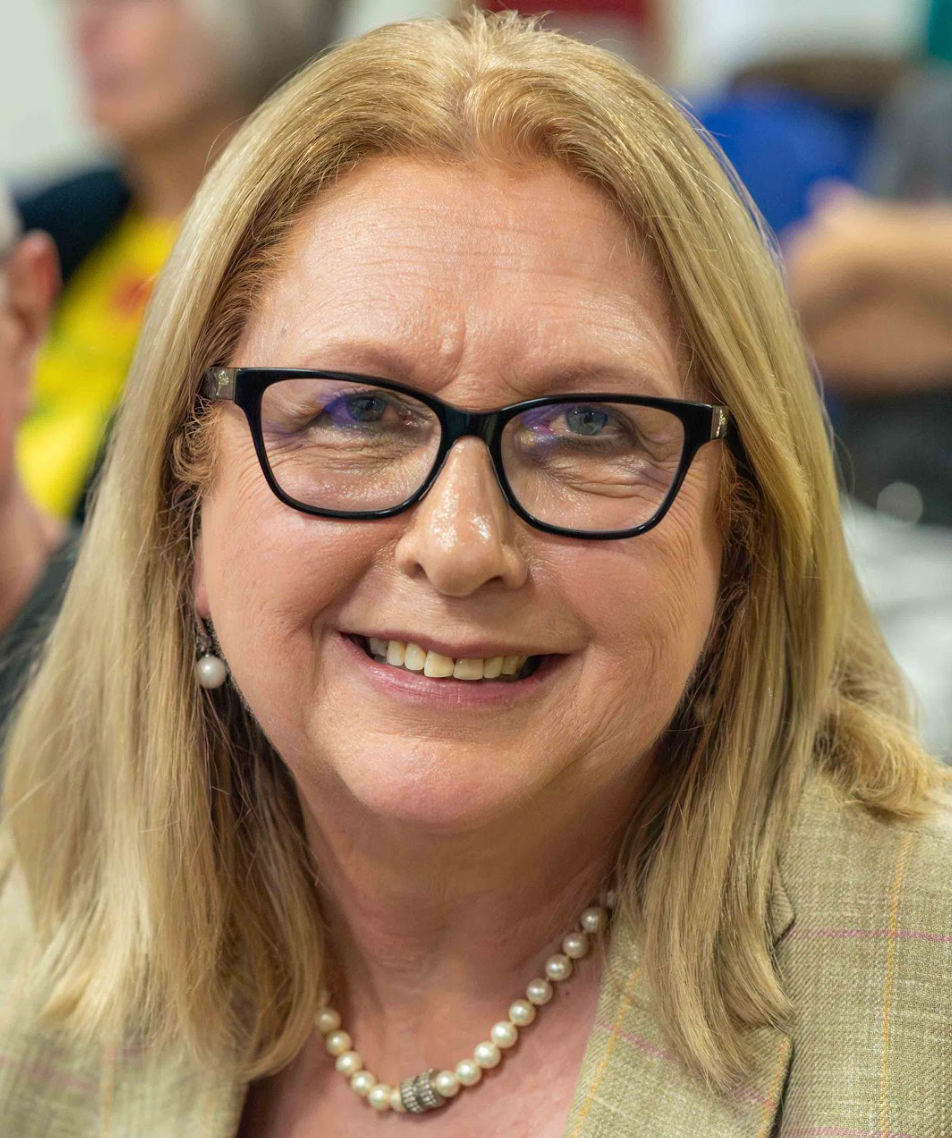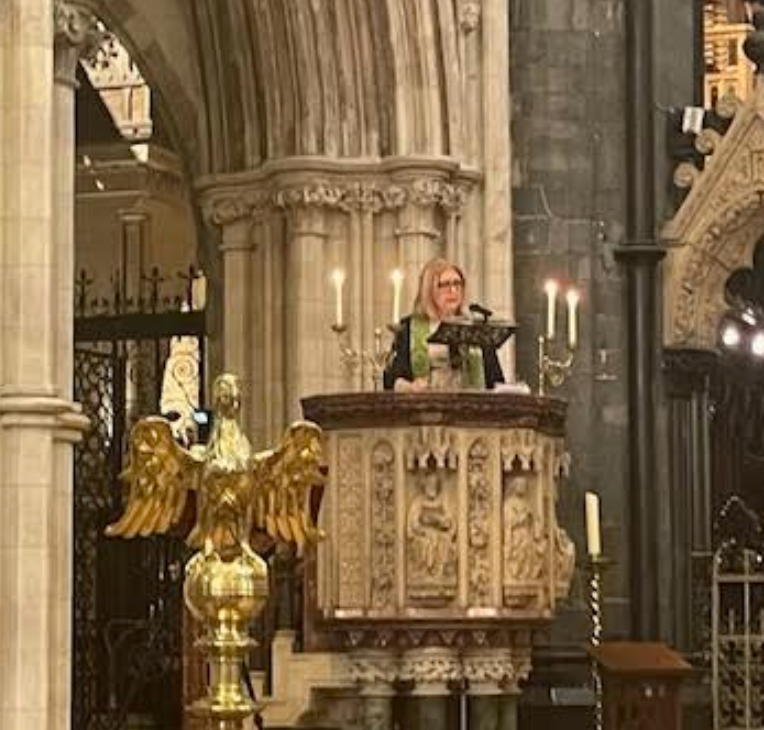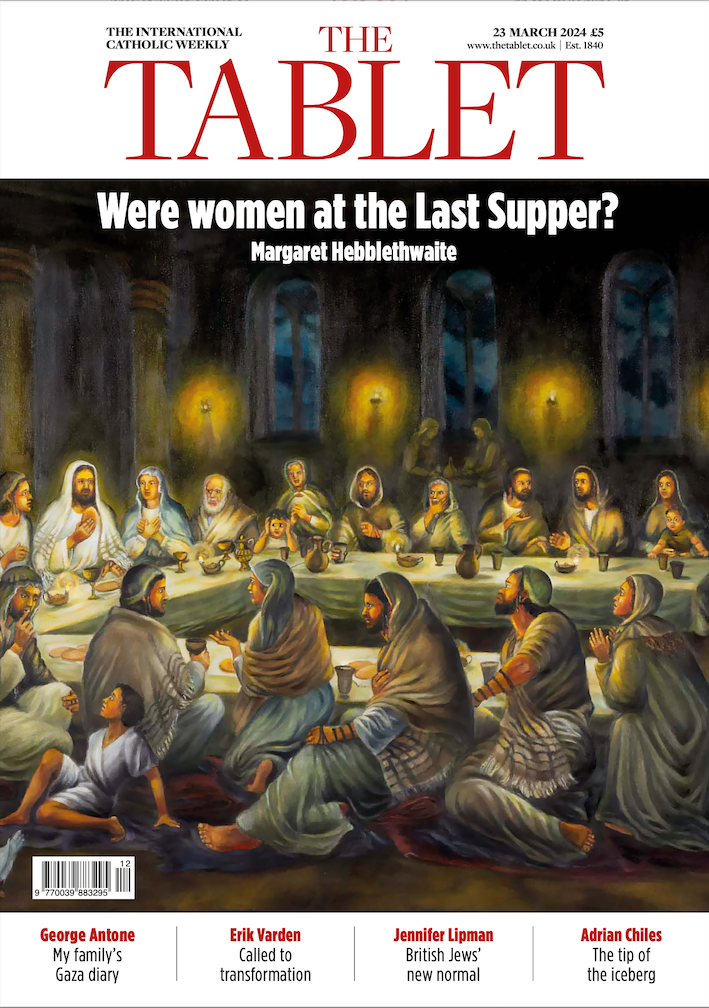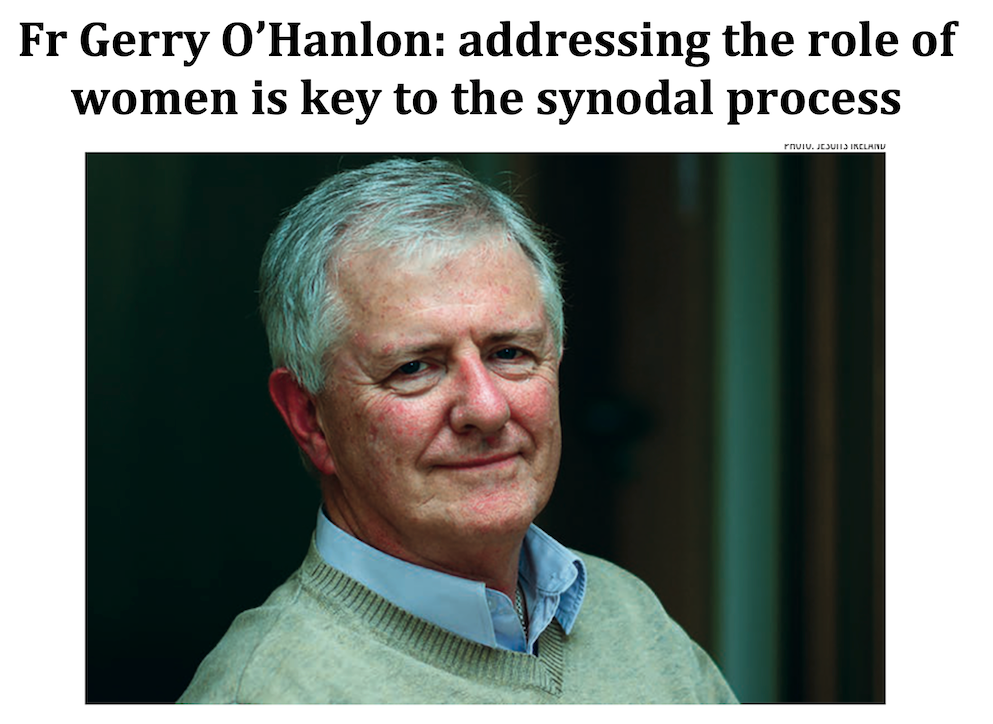3 Responses to Fiducia Supplicans: Soline Humbert; Joseph S. O'Leary; Mary McAleese

- Soline Humbert: Tensions between Love and Law
I have neither the desire nor the competence to write an analysis of Fiducia supplicans (FS). Instead, I would like to share some real-life stories which have resurfaced for me upon reading the document.
The first wedding I ever attended was that of my aunt and the one I came to call my uncle. I was four years of age. I knew they were getting married, but not that it was a civil wedding, ‘irregular’ in the eyes of the church since my uncle was a divorcee.
The years passed by, they had a child, but the marriage broke up soon after. The separation and subsequent divorce were quite painful and left a lot of bitterness in my aunt. Three decades passed without any contact; then my uncle somewhat unexpectedly reconnected with his daughter. I was close to my aunt, and I saw how this challenged her deeply, including at the level of her faith. She had kept all these years a diary of the breakup, which contained many painful entries. As she prayed she understood she should let go of it, which she eventually did. Soon after, she met up with her former husband, and much to everyone 's surprise and especially hers, their love was rekindled from the ashes.
Now in their early eighties they decided they would remarry. My aunt now found herself again in an ‘irregular union,’ since my uncle remained a divorcee (from his first wife). For the second time I attended their wedding which was, again, only a civil wedding. They were so much in love and so close, that people thought that they were celebrating a diamond wedding anniversary, not a wedding! They looked as if they had spent the last fifty years together. It was the eve of Pentecost and I could see the imprint of the Holy Spirit everywhere in the love between them. Their love which had died had literally been resurrected and there was so much healing and joy. A wonderful miracle.
But for the church authorities this was a sinful relationship, akin to adultery. There could be no ecclesiastical blessing. And my aunt would from now on be again excluded from receiving Communion. Until my uncle died that is, a few years later
In this story, the Canon Law concern with order and regularity cuts athwart the human development and the decisions based on love. The sharp distinction between those in a ‘regular’ union celebrated and blessed in church, and the others, the ‘irregulars,’ reminds me of the label put on some children, until recently, dividing them into ‘legitimate’ and ‘illegitimate.’ Pope Francis seems aware that the categories of Canon Law are not necessarily the prism though which God views our relationships, and that there are relationships that just do not fit into them but need pastoral accompaniment.
And this leads me to the other category of people mentioned in FS, the category more highlighted in discussions: same-sex couples. The early headlines shouted: ‘Vatican blessings for gay couples!’ I welcomed what appeared to be a more inclusive approach after the CDF document of a few years ago (‘No blessings for gays’), which it is. And for the first time the word couple is used. But I was dismayed when I started reading the list of all the conditions and restrictions. A good friend of mine, who is gay, called it: ‘a mean, little blessing.’ Of course that may be better than no blessing at all, just as a crumb of bread is better than a stone, but I do not recognize in it the extravagant generosity of the God of Jesus. I didn’t know whether to laugh or to cry when reading the expanded list of restrictions in the subsequent clarification from the Dicastery, because of pushback about the very notion that gay couples could be blessed at all. I couldn’t believe it ended up specifying the blessings would be all of 10-15 seconds.
This reminded me of another story, about my grandmother-in-law’s wedding day, 100 years ago. Decades later, when she spoke about it you could still hear some of the pain and hurt. She, a Roman Catholic had married a member of the Church of Ireland (Anglican) in what was then called a ‘mixed marriage.’ Yes, they had received a nuptial blessing. But it had been at 9 o'clock, in the sacristy, with no guests. Another mean, little blessing,’ as prescribed by canon law. An addendum is that when her husband died she was advised by the parish priest not to go to his funeral service because it was in a Protestant church, and therefore would be gravely sinful. She went anyway!
FS went out of its way to stress the difference between the pastoral and the doctrinal, and that blessings belong to the pastoral dimension and do not affect in any way the doctrinal teachings of the Church. There is no change, no development, and it may be over-sanguine to imagine that this is step in that direction; it could even by a ploy for fobbing it off.
Love cannot be controlled, and we need a good dose of humility when we claim we know what God's plan is for people. Besides a long life, two decades in the ministry of spiritual direction have shown me that the ways of God don’t fit in neatly in our ‘regular/irregular’ church categories. The Spirit blows where it wills, and so does Love. Let us celebrate it, rejoice in it, give thanks for it wherever we find it. As the late Fr Mychal Judge OFM asked: ‘Is there so much love in the world that we can afford to discriminate against any kind of love?’
2. Joseph S. O’Leary: Accompaniment, Dialogue, and Compassion
The clergy have taken responsibility for matrimony not only in sacramental celebration of weddings, including preparation for marriage, but also in for the canon law aspect, ensuring that couples were validly married; in many countries married in church counted as valid in the State’s eyes as well. When Pope Francis deplores ‘clericalism’ one of the things he means is a bureaucratic concern with order and regularity that is harshly unsympathetic with people in irregular situations—single mothers, divorcees, priests awaiting laicization—, shunning them rather than accompanying them. The various conundrums that can arise, especially in countries where divorce is easily available, require a response. Pope draws on the category of blessing to bridge the gap between those whose marital lives are in order and those who live with messy situations.
Blessings are not sacraments but ‘among the most widespread and evolving sacramentals’ (Fiducia supplicans [FS], 8). ‘Pope Francis proposed a description of this kind of blessing that is offered to all without requiring anything’ (FS, 27).
The short document does not develop a rich, sophisticated theological concept comparable with Augustine on Grace or Luther on Justification by faith. Blessing is invoked for a practical purpose, to close the gap between love and law, between boldly welcoming all and continuing to police moral and legal behaviors. The distinction between objective and subjective morality (whereby something objectively immoral could be ‘diminished in guilt, inculpable, or subjectively defensible,’ as Paul VI put it), which allowed condemnation of artificial birth control in principle and pastoral accommodation of it in practice, might be seen as a similar practical solution that avoids facing an issue with honesty, in open discussion. In the present case the most remarkable tension, or contradiction, is between the rejection of blessings of same-sex couples, characterized as sinful, only a few years ago and the encouragement of such blessings in the new document. The most striking and innovating feature of FS is that it addresses a kind word to gays and lesbians, something the Vatican has not done officially since it began to address same-sex questions explicitly in 1975 (Persona humana), and most ambitiously in a treatise on ‘the problem of homosexuality’ in 1986. Gays and lesbians appeared on the Vatican radar screen only as a problem for the CDF’s sense of order, and there was no sign of dialogue with the people concerned or of pastoral accompaniment of them in their path in life.
On a flight back from Africa last year, Francis told reporters: ‘People with homosexual tendencies are children of God. God loves them. God is walking with them. To condemn someone like this is a sin. To criminalize someone for homosexual tendencies is an injustice’ (Wall Street Journal, 5 February, 2023). Such an utterance says almost nothing, but it stresses the idea of accompaniment, and this is also the central thrust of FS and of the Pope’s pastoral policy in general. FS is the first time this policy has got an official articulation, minimal as it is; the danger is that it may be seen as solving the issue for now, instead of engaging in the human dialogue and theological rethinking that is required. Still talking of ‘someone like this’ (an embarrassed locution), the papal language does not yet really amount to listening or dialogue, since there is no forum for such dialogue in the Church (not even in the recent Synod).
Gay couples have been blessed by common sense pastors, and would be regarded by many of the clergy with admiration and envy. They have wrongfooted Vatican teaching by the unexpected success of their relationships and their impact on society. But there is a group whose need is greater and that FS does not mention, namely the T in LGBT, suffering from what the doctors call ‘gender dysphoria.’ Cardinal Fernández rather shockingly promised conservative critics unhappy with FS that they will be happier with a forthcoming document condemning ‘gender ideology’ and surrogacy. This kind of horse trading and scapegoating is inappropriate in dealing with real human beings and their suffering. I have a friend who is biologically female but identifies as a man and has had his name legally changed to match that gender identity. The problems and sufferings he has had to face are crushingly severe. Here too the church has a duty of accompaniment and dialogue, not pontification and condemnation.
A few years ago our former Irish President Mary McAleese, an outspoken Catholic woman, as well as Ssenfuka Joanita Warry, a brave activist in Uganda on behalf of heavily oppressed gays and lesbians, were disinvited by a Dublin-born cardinal from a women’s meeting supposed to be held in the Vatican. Here is ‘clericalism’ again, and the refusal of dialogue.
Pope Francis has put compassion center stage in his reading of the Gospel. In fact, that is perhaps the central feature of the character of Jesus, his quick response to those in distress and his speed in coming to their assistance, as a healer. Is that the trait we think of when we think of him? A regular orderly life, a bit of prayer, an offering of our work for the glory of God, is not that our Christian ideal? But the Gospel makes other demands: generosity, compassion, self-giving, sacrifice. We easily miss our neighbor’s distress, though it is all around us if we care to look for it. We choose the street where we will not meet someone asking us for money, stepping to the other side. There is a striking line in that cruel and almost unbearable play, King Lear: ‘Expose yourself to feel what wretches feel.’ When Pope Francis talks of accompaniment and dialogue he is calling us to that kind of compassionate tenderness. His heart is in the right place, and he has done quite a lot to disentangle the Gospel from the bureaucratic knots that threaten to stifle it. He has called on the whole Church to join him in this, through the synodal process, so as to become a welcoming, empathetic church, shaking off hypocrisy. In striking gospel joy and God’s unbounded love he encourages a more progressive and positive vision of human nature and its unexplored potential.
3. Mary McAleese: The First Step on a Damascene Road?
The Declaration Fiducia supplicans (FS) promulgated by the Dicastery for the Doctrine of the Faith with Papal approval on 23 December 2023 has provoked controversy and an unusual number of post-publication curial and papal explanations about its content. For all that its subject matter deals with access of Catholics in irregular unions to simple, spontaneous, informal blessings, in fact its import for the universal Church is far from simple. It deals with an issue that had been discreetly nudging some European dioceses, notably German, Austrian, Swiss, and Flemish, towards a new culture of inclusion of gay Catholics which countenanced priestly blessings for gay couples who were civilly married as jurisdiction after jurisdiction in the West made provision for same-sex marriage and traditional hostile attitudes to homosexuality gave way to acceptance, dismantling of oppressive laws, and the assertion of equal rights. In the global south the opposite was happening as resistance to gay rights provoked tighter laws against homosexuality (sometimes with the encouragement of Catholic bishops).
The issue flared when the German Catholic Church’s Synodal Way proposed to permit church blessings for Catholic gay civilly married couples. Their plan was decisively dashed when in February 2021 the Congregation for the Doctrine of the Faith published, with papal approval, its Responsum to ‘a dubium regarding the blessing of the unions of persons of the same sex.’ It concluded that ‘the Church does not have, and cannot have, the power to bless unions of persons of the same sex.’ The reasons advanced included that they would constitute ‘a certain imitation or analogue of the nuptial blessing’; homosexual unions are in no way ‘similar or even remotely analogous to God’s plan for marriage and family’; such relationships are not ‘objectively and positively ordered to receive and express grace’: God ‘does not and cannot bless sin.’
If the responsum was designed to end all debate on the subject it had the opposite effect. Its judgmental language chimed badly with what had been widely perceived as a more tolerant attitude in papal comments to reporters on a flight back from Brazil after World Youth Day, 29 July 2013: ‘If someone is gay and is searching for the Lord and has good will, then who am I to judge him?’ However often overlooked was the fact that he had prefaced his remarks by restating church teaching that views homosexual acts as sinful. Indeed more recently he had echoed Pope Benedict’s opposition to admitting homosexual men to the priesthood when in a private session, he advised the Italian Bishops’ Conference on the subject of admitting gay men to seminaries to train for the priesthood saying: ‘If in doubt, better not let them enter.’
There can be little doubt but that in the clamor of disappointment that greeted the Responsum ad dubium, Pope Francis came under enormous pressure to bring some kind of reconciling clarity to his views particularly as the reports from Synodal discussions at diocesan level, by then were indicating strong support for reform of church teaching on homosexuality among other things. Shortly before the October 2023 Synod of Bishops met, a small group of conservative cardinals pushed Pope Francis for that clarity. He did not give the answer they wanted. Instead according to FS the possibility was opened up of revisiting the Responsum ad dubium and ‘offering new clarifications’ ‘in light of Pope Francis’ fatherly and pastoral approach.’ The Declaration was presented as an explanatory update on the Responsum ad dubium rather than what it actually was, a contradiction which still leaves a lot of doubt about where the Pope is steering the bigger debate on magisterial teaching on homosexuality.
At one level the Declaration can be seen as little more than a limited concession to gay Catholic couples which permits a priest, if asked, to give informal ’short and simple pastoral blessings (neither liturgical nor ritualized) of couples in irregular situations (but not of their unions).’ The Declaration ‘remains firm on the traditional doctrine of the Church about marriage, not allowing any type of liturgical rite or blessing similar to a liturgical rite that can create confusion.’ To avoid confusion, the blessing must be free of all ‘wedding’ context including ‘any clothing, gestures, or words that are proper to a wedding’ (FS, 31). The Declaration suggests that ‘such a blessing may instead find its place in other contexts, such as a visit to a shrine, a meeting with a priest, a prayer recited in a group, or during a pilgrimage’ (FS, 40). At this level the Declaration slaps down the more liberal, advanced dioceses which had moved towards formal liturgical blessings for gay couples, while also slapping down the narrow view of blessings and even narrower view of God’s grace presented in the Responsum ad dubium which offered precisely nothing to gay Catholics. I remember my own reaction to the Responsum and in particular the realization that it had been published with the full acquiescence of Pope Francis. As the sister, mother, and mother-in-law of three deeply Christian gay men I was horrified to the point of despair, enough to send a scathing letter to Pope Francis in which I quoted (in my own translation) the final stanza from the famous Irish love poem ‘Dónal Óg’:
You took my North, you took my South,
You took my East, You took my West,
You took the sun from me and you took the moon
And I do believe you even took my God from me.
Nowhere in that disheartening document could I see Christ, nowhere could I see God’s love, and worse still nowhere could I see a place to be part of a loving God’s complex family where grace flowed freely. I imagine I was not alone. I imagine Pope Francis was the recipient of a lot of letters from the faithful who felt they had reached the end of the road of faith in the Church and faith in him as its leader. The Declaration when it came was very much an act of putting a finger in that disintegrating ecclesial dyke. If that is all it is it will not be enough.
At another level, the most critical level, the Declaration has to be potentially the first step on a Damascene road to the ‘fundamental revision’ of Catholic Church teaching on homosexuality called for by Cardinal Hollerich of Luxembourg, then President of the Commission of the Bishops' Conferences of the European Union (from 2018 to 2023) and currently Relator General of the Synod on Synodality. He believes ‘that the sociological-scientific foundation of this teaching is no longer true’ and that ‘we are thinking ahead in terms of doctrine. The way the pope has expressed himself in the past can lead to a change in doctrine.’ Cardinal Hollerich fortunately is not a lone voice, though he has many episcopal and other opponents within the Church. Accompanying each other, listening to one another, standing in the shoes of the other, and then starting anew in dialogue and consultation, we may outgrow frozen teachings on LGBT questions, as we previously overcame horrendous historic teachings which favored slavery, sexism, sectarianism, all with countless victims. Fiducia supplicans may seem to offer extremely little from Mother Church to her LGBT children, yet it could signal the beginning of an era of discussion, learning, and frank sharing, melting long centuries of hypocrisy.
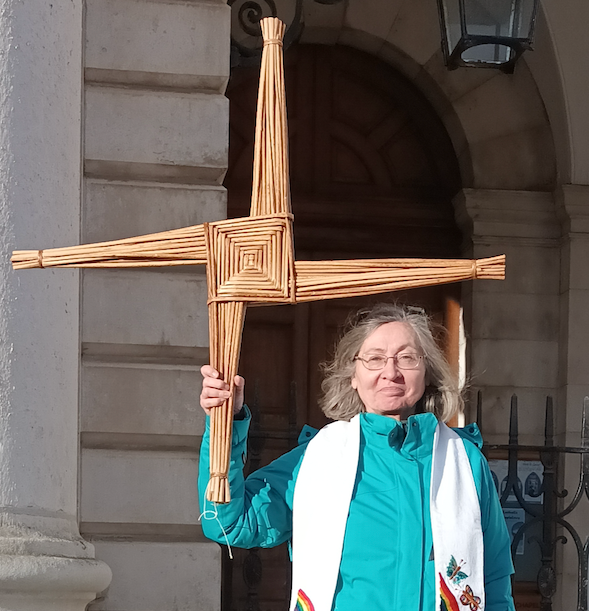

Women are a problem for the Catholic Church, an institution with ingrained misogyny - Soline Humbert
About us
We are working to develop inclusive communities based on our 6 Aims, while being open to engage with all sections of the church about our lives in the church today.
Contact Info








